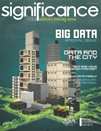|
Significance, a magazine produced by the Royal Statistical Society has a special issue on Big Data and it has some really interesting articles, including Peter Norvig on why language is statistical in nature.
The only downside is that you can't read any of the articles without a subscription or access to an academic library.

If you are interested in big data the article of interest are:
- Big data and city living – what can it do for us?
Big data is transforming our cities. Sallie Ann Keller, Steven E. Koonin and Stephanie Shipplook at the benefits that big data can bring to society – and at some of the challenges as well.
- How much information is there in the “information society”?
We know our brave new world is being transformed by data. But how much more of it is there than before? Martin Hilbert finds huge untapped capacity to process information.
- A statistical journey to the center of the Earth
What lies beneath our feet? Huge quantities of data and complex analysis have revealed an Earth that is spinning at its core, says Ping Ma.
- The chaos within: Exploring noise in cellular biology
The data explosion is transforming all fields of science, biology included. It is also transforming our understanding of life itself – and making us aware of the random nature of life's processes.Iain Johnston explains.
- Big data in astronomy
Astronomy has been one of the first areas of science to embrace and learn from big data. Eric D. Feigelson and G. Jogesh Babu tell of the efforts, the challenges, and some of the ways it is transforming our knowledge of the cosmos.
- Nowcasting the mood of the nation
Vast data‐streams from social networks like Twitter and Facebook contain a people's opinions, fears and dreams. Thomas Lansdall‐Welfare, Vasileios Lampos and Nello Cristianini exploit a whole new tool for social scientists.
- Colorless green ideas learn furiously: Chomsky and the two cultures of statistical learning
Language recognition programs use massive databases of words, and statistical correlations between those words, to translate or to recognize speech. But correlation is not causation. Do these statistical data‐dredgings give any insight into how language works? Or are they a mere big‐number trick, useful but adding nothing to understanding? One who holds the latter view is the theorist of language Noam Chomsky. Peter Norvig disagrees.
If you only have time to read one of them then make it Peter Norvig's Colorless green ideas learn furiously: Chomsky and the two cultures of statistical learning. If you can't access the published article a longer, but less polished version, is at http://norvig.com/chomsky.html

Edera Protect Expands Security Model
27/03/2025
Edera Protect for Kubernetes is now available as a 1.0 release that the company says is generally available and production-ready. Improvements in the 1.0 release include an expanded security mode [ ... ]
|
Microsoft Announces Hyperlight Wasm
01/04/2025
Microsoft has released Hyperlight Wasm, a Hyperlight virtual machine (VM) "micro-guest" that can run Wasm component workloads written in many programming languages.
| | More News |
|


